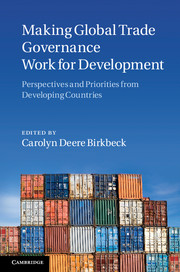 Making Global Trade Governance Work for Development
Making Global Trade Governance Work for Development implications for global trade governance
from Part I - Global trade governance
Published online by Cambridge University Press: 07 September 2011
The relation between trade liberalization and the environment has been the object of many studies, both in the academic and the policy-making communities. Myriad research projects have been carried out at the sector level or at the economy-wide level, using applied general equilibrium models. A great variety of environmental dimensions have been covered by these studies (Khan 2002; UNEP-IISD 2005; Gallagher 2008). However, one crucial theme has escaped most of these analyses. It is the fact that trade liberalization is but one component of a bigger policy package in which monetary and fiscal policies, financial deregulation and income policies play a much more important role in determining and shaping the economic forces that affect the environment. Trade and environment studies are too often carried out as if the other macroeconomic policies did not matter. Even themes such as subsidies and exchange rate manipulation are seen through the lens of trade policy, not as key components of fiscal and monetary policies. This is unfortunate because it is difficult to interpret the impact of trade and trade liberalization on the environment (and on people’s livelihoods) without an analysis of the entire set of macroeconomic policies that condition trade dynamics.
This chapter makes the argument that taking sustainability objectives seriously demands that we examine global trade, and its governance, not in isolation but in light of their interaction with the other components of macroeconomic policies and governance systems.
To save this book to your Kindle, first ensure [email protected] is added to your Approved Personal Document E-mail List under your Personal Document Settings on the Manage Your Content and Devices page of your Amazon account. Then enter the ‘name’ part of your Kindle email address below. Find out more about saving to your Kindle.
Note you can select to save to either the @free.kindle.com or @kindle.com variations. ‘@free.kindle.com’ emails are free but can only be saved to your device when it is connected to wi-fi. ‘@kindle.com’ emails can be delivered even when you are not connected to wi-fi, but note that service fees apply.
Find out more about the Kindle Personal Document Service.
To save content items to your account, please confirm that you agree to abide by our usage policies. If this is the first time you use this feature, you will be asked to authorise Cambridge Core to connect with your account. Find out more about saving content to Dropbox.
To save content items to your account, please confirm that you agree to abide by our usage policies. If this is the first time you use this feature, you will be asked to authorise Cambridge Core to connect with your account. Find out more about saving content to Google Drive.